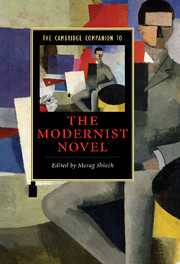Book contents
- Frontmatter
- Reading the modernist novel: an Introduction
- 1 Modernists on the art of fiction
- 2 Early modernism
- 3 Remembrance and tense past
- 4 Consciousness as a stream
- 5 The legacies of modernism
- KEY NOVELISTS
- 6 James Joyce and the languages of modernism
- 7 Tradition and revelation: moments of being in Virginia Woolf’s major novels
- 8 Wyndham Lewis and modernist satire
- 9 D. H. Lawrence: organicism and the modernist novel
- 10 Joseph Conrad’s half-written fictions
- 11 Djuna Barnes: melancholic modernism
- 12 William Faulkner: an impossibly comprehensive expressivity
- 13 Writing lives: Dorothy Richardson, May Sinclair, Gertrude Stein
- 14 C. L. R. James, Claude McKay, Nella Larsen, Jean Toomer the ‘black Atlantic’ and the modernist novel
- 15 Situating Samuel Beckett
- Further reading
- Index
11 - Djuna Barnes: melancholic modernism
from KEY NOVELISTS
Published online by Cambridge University Press: 28 July 2007
- Frontmatter
- Reading the modernist novel: an Introduction
- 1 Modernists on the art of fiction
- 2 Early modernism
- 3 Remembrance and tense past
- 4 Consciousness as a stream
- 5 The legacies of modernism
- KEY NOVELISTS
- 6 James Joyce and the languages of modernism
- 7 Tradition and revelation: moments of being in Virginia Woolf’s major novels
- 8 Wyndham Lewis and modernist satire
- 9 D. H. Lawrence: organicism and the modernist novel
- 10 Joseph Conrad’s half-written fictions
- 11 Djuna Barnes: melancholic modernism
- 12 William Faulkner: an impossibly comprehensive expressivity
- 13 Writing lives: Dorothy Richardson, May Sinclair, Gertrude Stein
- 14 C. L. R. James, Claude McKay, Nella Larsen, Jean Toomer the ‘black Atlantic’ and the modernist novel
- 15 Situating Samuel Beckett
- Further reading
- Index
Summary
'I believe this may be our last chance to do something remarkable in the way of imaginative literature,' T. S. Eliot declared, when recommending Djuna Barnes’s (1892-1982) Nightwood (1936) for publication with Faber and Faber in 1935. Initial readers, while acknowledging the virtuosity of the novel’s style, were yet largely bemused by the obscurity of its 'plot' and discomforted by a pervasive overtone of the profane and the sacrilegious. In his introductory Preface for the American edition the following year, Eliot set about elucidating the structure and method of the novel, downplaying its more controversial subject matter and forestalling charges of unreadability. Nightwood, he explained, 'demands something of the reader that the ordinary novel-reader is not prepared to give', because 'it is so good a novel that only sensibilities trained on poetry can wholly appreciate it'. To understand the novel as a masterpiece of modern art, in other words, the reader should be prepared to suspend any expectation of conventional linear narrative and recognize that it is constructed according to the formalist principles of modern poetry. Nightwood having been claimed by Eliot as the final expression of high modernism, American reviewers followed his lead with palpable relief, the Brooklyn Eagle going so far as to recommend it as 'an excellent companion piece for “The Waste Land”'.
- Type
- Chapter
- Information
- The Cambridge Companion to the Modernist Novel , pp. 165 - 177Publisher: Cambridge University PressPrint publication year: 2007
- 4
- Cited by



